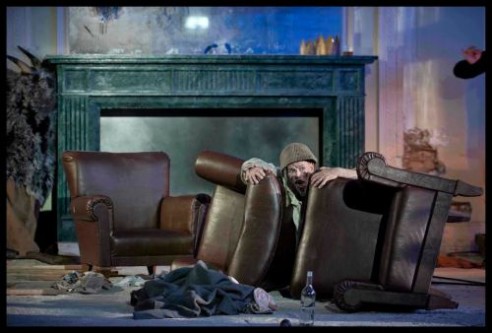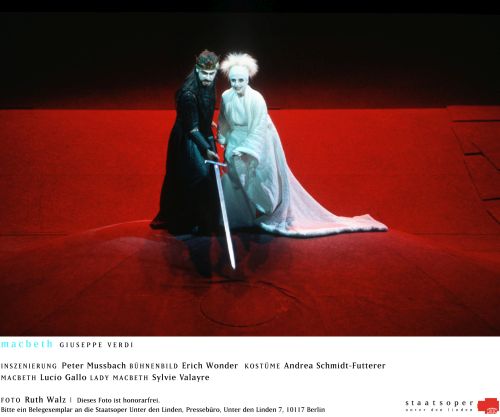 Germany Sciarrino: Macbeth, Opera Lab Berlin, David Robert Coleman (conductor), Staatsoper Unter den Linden, Berlin, 21.6.2014
Germany Sciarrino: Macbeth, Opera Lab Berlin, David Robert Coleman (conductor), Staatsoper Unter den Linden, Berlin, 21.6.2014

Cast:
Macbeth: Otto Katzameier
Lady Macbeth: Carola Höhn
A Sergent, Fleance, a Killer, a Soldier: Katharina Kammerloher
Banquo, a Ghost, a Servant: Stephen Chambers
Duncan, a courtier, Macduff: Timothy Sharp
Voci: Sónia Grané, Lena Haselmann, Uta Buchheister, Magnús Hallur Jónsson, Jakob Ahles, Ulf Dirk Mädler
Production:
Director: Jürgen Flimm
Conductor: David Robert Coleman
Sets: Magdalena Gut
Costumes: Birgit Wentsch
Lighting: Olaf Freese
A frenzied murmur, the wisp of a flute—these sounds and more are woven into the aural tapestry of ephemeral instrumental utterances in Salvatore Sciarrino’s Macbeth. The one-hour-and-forty-minute opera was performed in a former orchestra rehearsal room in Berlin’s Staatsoper Unter den Linden, which is currently undergoing renovations and is closed to the public. The under-construction setting, direction by Jürgen Flimm and the Italian composer’s avant-garde music combined to create a performance that was both visceral and haunting.
Macbeth, which was unveiled to the public in 2002, is one of three new productions premiering during the Staatsoper’s (somewhat ominously named) INFEKTION! festival, which celebrates new music theater. This year’s focus is on the 67-year-old Sciarrino. The composer’s Lohengrin also received a new treatment earlier this month.
The venue, a Baroque-style parlor with tall ceilings, marble fireplace and extravagant molding, hinted at the space’s former glory, while haphazard chunks of plaster clinging to exposed brick walls harkened to the present state of work-in-progress. A small audience of around 100 sat on plywood bleachers opposite one another. The singers performed in the space between, so close that nary a facial twitch could go unnoticed. Set in the intimate quasi theater-in-the-round setting as it was, I left wondering how the production could possibly work anywhere else: such intimacy seemed crucial.
The music, as well as the choice of location, heightened the tension, uncertainty and mental unease rife in Shakespeare’s tale of the doomed Scottish king. The musicians hailed from Opera Lab Berlin, an ensemble dedicated to performing contemporary works. Conductor David Robert Coleman led them in two different groups—one in the main hall, and the other hidden from view in an adjacent room. The latter’s notes echoed through the doorway. Like a spirit in the attic, the removed sound added to the piece’s haunting effect.
In the self-taught composer’s work, lyricism is basically absent. The musicians come together in a series of fragments which, while sometimes seeming downright random, still collude in creating an atmosphere of madness and bloodlust rife in Shakespeare’s tale.
Sciarrino doesn’t shy away from tradition. Direct musical quotation is candid and reoccurring—the ghost of Banquo sings several bars taken directly from the finale of Mozart’s Don Giovanni – the most melodic of the evening. Verdi makes an appearance shortly thereafter as the ghost sings Renato’s aria from the first scene of Un Ballo in Maschera. This, according to Sciarrino, is how one comes to terms with the “father figures” of the classical past; one must raise them from the dead, only to kill them shortly thereafter and thus clear the way for new invention.
Sciarrino’s path to freedom winds through a landscape dominated by unvoiced sounds such as the airy piping of a flute and percussive thumping of a violin’s wooden core. Vocal lines are often reduced to a whisper or mumble, making the Italian libretto nearly unintelligible. Waves of disjointed sounds swelled and ebbed, undercut at times by forceful percussive bursts.
German bass-baritone Otto Katzameier played Macbeth as a crushed shell of a man—the character’s mental turmoil was apparent from start to finish. Lacking the bravado of Shakespeare’s figure, he assumed a haunted look throughout the performance, sauntering around the room like a deeply disturbed sleepwalker. Sciarrino’s score calls for extreme vocal gymnastics, and Katzameier navigated octave-leaps and frequent falsetto lines with ease.
The witches in the playwright’s original work were replaced here by a group of six singers, i voci. Dressed in matching crimson gowns, they shadowed Macbeth and his wife during their pinnacles of madness, attending to them and egging them on in their murderous plots. Lady Macbeth was played by Carola Höhn who brought every bit of herself to the performance, coming across as unhinged as her husband, particularly during the frenzied mad scene in Act III.
With such a superb cast, staging and setting, future productions of Sciarrino’s Macbeth will be hard pressed to live up to this one. Sciarrino himself was in the audience that evening, and greeted members of the cast individually as they took their bows. He seemed quite pleased. Perhaps the greatest disappointment is that, given the limited seating and short run, so few will have the opportunity to see the production.
Sarah Hucal
